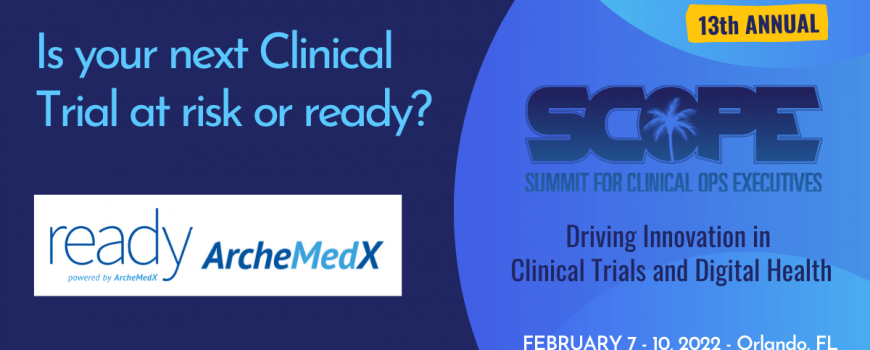Updated 16 November 2021.
The clinical operations conference landscape was nothing if not fluid in 2021, so you may be wondering what events focused on clinical research will remain on the calendar. Though many conferences and meetings have gone virtual, many are emerging as in-person or hybrid this year.
To help you keep track of all the changes, the ArcheMedX team put together this handy roundup of the top events we have on our annual calendar, along with some specific details to help you find that perfect clinical operations meeting for the upcoming year.
January Events
Dates: Jan. 11 (San Francisco, CA) and Jan. 18-22 (Virtual)
Location: Hybrid – San Francisco, CA + Virtual
Cost: $499 through 17 Dec., $599 after. Virtual event only – FREE – but limited tickets.
Relevant topics: J.P. Morgan Healthcare topics, leadership
Every January, the J.P. Morgan Healthcare Conference sets the tone for the year to come. This year, the meeting’s hybrid, so Fierce Life Sciences is bringing you both an in person, and a virtual free event. They advertise a program that goes beyond the panel discussions they’re known for. Using CEO interviews, daily news recaps, and virtual roundtables, they will cover topics from diversity to virtual care.
February Events
Dates: Feb. 7-10
Location: Hybrid: Virtual + Orlando, FL
Cost: Choose virtual OR in-person: $1449 until Nov. 19, $1899 after that date
Access to both virtual and in-person: $2099 until Nov. 19, $2449 after that date
Relevant topics: Protocol development, Feasibility and site selection, Study start-up, Clinical data innovation, Digital endpoints, Real world data, Patient engagement, Enrollment modeling, Enrollment and retention
Cambridge Healthtech, the producer of this event, is a major thought leader in our industry and produces some of the best-attended events in life science. Back after mostly virtual events in 2021, the 2022 event is nearly sold out for sponsors so attendance will likely be at a similar high. Expect to join clinical operations leaders & clinical research innovators from pharma, biotech and academia focusing on why trials succeed and why they fail, as well as budgeting, measurement, and outsourcing.
Dates: Feb. 15-16
Location: Burlingame, CA
Cost: Free for pharma, biotech, and medical device attendees
Relevant topics: Clinical supplies, patient centricity, operational challenges
Part of a regional series of outsourcing in clinical trials events, the west coast edition will enable clinical operations professionals to share knowledge and brainstorm solutions to issues regarding clinical trial outsourcing. Throughout the two days, attendees will enjoy a program of case-study presentations, interactive panel discussions, prize draws and networking opportunities which will enable the audience to discover practical takeaways.
March Events
Dates: March 7-10
Location: Hybrid – Virtual + Miami, FL
Cost: In-person – $1799, Virtual only – $1199
Relevant topics: Decentralized clinical trials, diversity in clinical trials
This is a new event appearing on our calendars, and it’s coming in with some big promises – particularly that speakers will be delivering actual case studies on decentralized and hybrid clinical trials they’ve run. You’ll also see some focus on diversity and other current topics, but hearing from the clinical operations leaders who are walking the walk in DCTs will be the main draw.
Dates: March 29-30
Location: Raleigh, NC
Cost: Free for pharma, biotech, and medical device attendees
Relevant topics: Clinical supplies, patient centricity, operational challenges
Part of a regional series of outsourcing in clinical trials events, the southeast edition will enable clinical operations professionals to share knowledge and brainstorm solutions to issues regarding clinical trial outsourcing. Throughout the two days, attendees will enjoy a program of case-study presentations, interactive panel discussions, prize draws and networking opportunities which will enable the audience to discover practical takeaways.
Dates: March 29-31
Location: Hybrid: Brussels, Belgium + Virtual
Cost: For the in-person event: Members – €1785 until Nov. 17; €2258 after. Non-members – 1964 until Nov. 17; €2483 after. For virtual access only: €2235.
Relevant topics: Real-World Evidence & Data Standards, Pharmacovigilance and Safety, Clinical Development & Operations
Traditionally billed as the intersection of science, healthcare, and regulation, DIA Europe is a strong opportunity alongside the later DIA events. Rebounding from a year of virtual events, this hallmark of the pharmaceutical industry calendar is back in person for 2022.
Dates: Mar. 30-31
Location: Newport Beach, CA
Cost: Members – $575, Non-members – $650
Relevant topics: FDA Clinical research requirements, Enhancing success through communication and financial incentives, and Assuring confidence in clinical research.
Want real face-to-face time with contacts from the FDA? Do it here. This two-day conference is intended to share information among FDA representatives and the regulated community. Expect a focus on helping you to understand regulations, guidelines and practices, as well as methods and opportunities to enhance your product development experience. The FDA has proven an ability to adjust for the benefit of the industry during COVID-19. Will that continue?
April Events
Dates: Apr. 22-25
Location: Orlando, FL
Cost: Members – starts at $499. Non-members – starts at $699.
Relevant topics: Study Management & Conduct, Regulatory Trends & Compliance, Leadership & Career Growth, Workforce Development, Technology & Future Trends
ACRP made a big change for their 2021 event and made it an all-access pass for year round learning. However, they’ve pulled back on that approach and are back for a one big annual event in Orlando. With a major focus on best practices and advancing your clinical research career, this event is probably best for those in execution and collaboration roles.
Dates: Apr. 20-21
Location: Barcelona, Spain
Cost: €1399 until Dec. 17, €1499 until Jan. 21, €1599 until Mar. 4, €1749 after
Relevant topics: Protocol development, Feasibility and site selection, Study start-up, Clinical data innovation, Digital endpoints, Real world data, Patient engagement, Enrollment modeling, Enrollment and retention
SCOPE Europe is a smaller, newer version of the well-known and well-attended SCOPE Summit, usually held in Orlando. Expect to join clinical operations leaders & clinical research innovators from pharma, biotech and academia focusing on why trials succeed and why they fail, as well as budgeting, measurement, and outsourcing. Plus, any clinical operations conference in beautiful Barcelona is one to check out!
Dates: Apr. 27-28
Location: London, UK
Cost: £530 plus £106 VAT
Relevant topics: Bioethics, regulations, patient recruitment, site selection, real-world data, data integration & Strategy, outsourcing, vendor management, quality (QbD) in Trial Conduct, risk-based monitoring
A month later than it was in 2021, Clinical Trials Connect intends to focus on the global health and clinical trials around the world. Focused heavily on innovations across the clinical trial lifecycle, expect to gain better knowledge of the implications of clinical trials in prevention, diagnosis, clinical trial-related ethics and disease treatments.
May Events
Dates: May 1-4
Location: Virtual
Cost: TBD, but past prices started as low as $295
Relevant topics: clinical operations, quality & risk management; site management; contracts; budgets & billing; regulatory compliance; management & professional skills
A favorite in the industry, MAGI puts together a multi-day agenda, intended for attendee flexibility. About half of MAGI attendees have leadership roles like CEO, vice president, or director. About three-quarters have eight or more years of clinical research experience. With over 50 sessions, and a thorough online catalog, you will likely find some great content opportunities.
Dates: May 9
Location: Virtual
Cost: TBD
Relevant topics: Patient-centric clinical trials, digital transformation, decentralized clinical trials
Not much is available about this event yet, but the 2021 conference was a three-day virtual meeting that covered topics highly skewed to decentralizing clinical research. 2022 appears to continue this trend, but also teases some more unique fare, like agile clinical trial design, digital patient recruitment and support, and novel endpoints.
Dates: May 15-18
Location: San Diego, CA
Cost: TBD
Relevant topics: Clinical trial design, Recruitment, Outcomes, Trial management, Trials in crisis
Bringing together a broad swath of the community, this event aims to attract professionals from academia, the pharmaceutical and device industries, government agencies, medical groups and centers, and clinical research entities. Back from being virtual in 2021, this conference features a theme focused on informing public health policy with compelling evidence.
Dates: May 24-25
Location: King of Prussia, PA
Cost: Free for pharma, biotech, and medical device attendees
Relevant topics: Clinical supplies, patient centricity, operational challenges
Part of a regional series of outsourcing in clinical trials events, the east coast edition will enable clinical operations professionals to share knowledge and brainstorm solutions to issues regarding clinical trial outsourcing. Throughout the two days, attendees will enjoy a program of case-study presentations, interactive panel discussions, prize draws and networking opportunities which will enable the audience to discover practical takeaways.
June Events
Dates: June 19-23
Location: Hybrid: Virtual + Chicago, IL
Cost: Early bird rates start at $1399 for members, and $1819 for non-members
Relevant topics: Clinical safety, Early phase clinical research, Patient engagement
Traditionally billed as the intersection of science, healthcare, and regulation, DIA Global usually hosts everything from patients to regulators – attendees from across the spectrum of the product life cycle. This hallmark of the pharmaceutical industry calendar is hybrid this year.
September Events
Dates: Sept. 13
Location: Virtual
Cost: Free!
Relevant topics: Rare disease research and clinical trials
As the title suggests, this is not a general clinical operations conference. A lot of the usual topics are covered, from decentralized clinical trials to patient recruitment to COVID-19, but every session is specific to rare disease. There will be a heavy session load from sponsors, though, with nearly every other session time taken up by sponsor sessions.
Dates: Sept. 13-14
Location: Boston, MA
Cost: TBD, but in 2021 early bird rates started at $600 (virtual) and $1795 (in-person)
Relevant topics: Real world data, Clinical trial readiness, Patient data access and ownership, Digital biomarkers, Modernizing clinical endpoints, Protocol simulation, Big data & AI, Patient-centered trials
Pfizer and Janssen started DPHARM, and are still part of the steering committee. It’s no wonder then that the past speaker list features some of the industry’s heavy hitters; J&J, BMS, Merck, and many others have made an appearance in the past. We expect reasonable attendance from mid-to-large pharma, biotech (all sizes), CROs and sites.
Dates: Sept. 16-18
Location: Orlando, FL
Cost: $750 for non-members includes an annual SOCRA membership
Relevant topics: Site efficiency and effectiveness, Centralized monitoring, Remote monitoring, Regulatory and quality parameters of electronic data records, e-consent, IRB approval
Touting over 1,000+ attendees, SOCRA annual draws investigators, research coordinators, research associates, project managers, consultants, educators, and administrators from across the life sciences industry. There are some great, specific tracks servicing topics like pediatrics, oncology, and behavioral health, as well as broad topics like Site Management and Training. Plus, there are a number of pre-conference workshops available to extend your learning.
Dates: TBD
Location: TBD – but 2021 was a hybrid event: Virtual + Boston, MA, USA
Cost: TBD
Relevant topics: Drug development, Manufacturing strategy & bioprocessing, Biopharma alliance trends, Biopharma M&A trends, AI’s potential role in the revolution of drug discovery, Machine learning
With Boston the epicenter of the life sciences industry, this event’s location is likely borne out of convenience rather than a focus on the local community’s interests. Though we’ve yet to see what 2022 will be, the 2021 Biotech Week Boston was a hybrid event, hosted over 10 days in both the city and online. This event tends to be comprehensive, bringing thought leaders, experts, and startups from discovery, financing, event planning, manufacturing, and clinical trials.
Dates: TBD
Location: TBD
Cost: TBD, but 2021 was $695 for members, $795 for non-members, and group rates available
Relevant topics: AI and machine learning, Data management, Clinical site immersion, Risk based quality monitoring, Patient safety
The Society for Clinical Data Management (SCDM) makes it clear that this is a very focused event, designed to educate and advocate for the data scientists and data managers of our industry. Since it’s virtual, and with a (relatively) low cost to attend, this could be a great upskilling opportunity for anyone interested in becoming more knowledgeable about data management, the future of AI in clinical research, or emerging data management trends.
October Events
Dates: Oct. 7-9
Location: Hollywood, FL, USA
Cost: Early bird rates start as low a s$998
Relevant topics: Site to industry productivity, Process and communication, Business development, Patient recruitment, Social media, Contracts & budgets and Clinical technology
Produced by SCRS (Society for Clinical Research Sites), past attendees to the Global Site Solutions Summit give this event rave reviews. Heavily skewed to the sites, this is a great event for sponsors or CROs that need to network or engage more directly with site leaders. With a mix of debates, sessions, workshops, and focus groups, you will have a diverse set of opportunities to engage with site personnel and leadership.
Dates: Oct. 12-13
Location: Boston, MA, USA
Cost: Free for pharma, biotech, and medical device attendees
Relevant topics: Clinical supplies, patient centricity, operational challenges
OCT returns to Boston for another one of its regional clinical trials conferences. They tout the aim of promoting successful collaboration among the clinical trials community. The agenda is forthcoming, and so are registration details.
Dates: Oct. 21-22
Location: Seattle, WA
Cost: Free for pharma, biotech, and medical device attendees
Relevant topics: Clinical supplies, patient centricity, operational challenges
Part of a regional series of outsourcing in clinical trials events, the Pacific Northwest edition will be a face to face event, unlike many of the others – and enable clinical operations professionals to share knowledge and brainstorm solutions to issues regarding clinical trial outsourcing. Throughout the two days, attendees will enjoy a program of case-study presentations, interactive panel discussions, prize draws and networking opportunities which will enable the audience to discover practical takeaways.
Dates: TBD
Location: Copenhagen, Denmark
Cost: Free for pharma, biotech, and medical device attendees
Relevant topics: Clinical supplies, patient centricity, operational challenges
Part of a regional series of outsourcing in clinical trials events, the Nordics edition will be a face to face event, unlike many of the others – and enable clinical operations professionals to share knowledge and brainstorm solutions to issues regarding clinical trial outsourcing. Throughout the two days, attendees will enjoy a program of case-study presentations, interactive panel discussions, prize draws and networking opportunities which will enable the audience to discover practical takeaways.
November Events
Dates: Nov. 7-9
Location: Amsterdam, Netherlands
Cost: TBD, but 2021 was free for sponsors, £1799 for CROs
Relevant topics: Partnerships and outsourcing, operations, clinical trials technology, innovation
Clinical Trials Europe brings together clinical industry stakeholders to share experiences, benchmark strategies and discover new ideas. Last year this event was virtual, and focused heavily on COVID’s impact to clinical development.
Dates: Nov. 7-10
Location: Boston, MA, USA
Cost: Starting at $2195
Relevant topics: Clinical development, Digital Biomarkers, Artificial intelligence, Digital therapeutics, Real world evidence, Decentralized clinical trials, Ecosystem Financial Viability, Neuroscience, Regulatory Issues, AR/VR/XR, Voice as an Endpoint
One of the few clinical operations conferences offering year round events as part of your registration, CNS Summit is a well-known and well-attended event for those in the central nervous system therapeutic area. CNS usually brings 750+ clinical development leaders from small, mid-size, and big pharma, CRO’s and service companies, technology companies, and research sites. But some things have changed – the event has moved this year to Boston, instead of Boca Raton. They also now require you to “Apply” to attend in order to balance attendance.
Dates: TBD
Location: TBD, but 2021 was virtual
Cost: TBD
Relevant topics: Trial management, including Patient recruitment and retention, Patient engagement, Site selection, Study start-up, Data Analytics, Integrating Data and Tech into Clinical Trials, Risk-Based Monitoring
Advertised as hosting only around 80 attendees, and with a focus on senior leadership, this event requires some vetting to allow you in. The summit places a heavy emphasis on networking and collaboration, highlighting more than 12 networking hours and an executive lunch (when in person).
Dates: TBD
Location: Vancouver, BC, Canada
Cost: TBD, but 2021 started at €454 Early bird pricing
Relevant topics: Clinical study designs, clinical trials, CRO/sponsor clinical trials, outsourcing, clinical and medical case reports
This may be the broadest-reaching conference on this list that includes clinical operations topics. There are 22 different tracks, with one dedicated to clinical trials. If you’re looking for a clinical operations conference that has it all – or if you wear hats across the entire drug development lifecycle, this event could be a good fit. If not, it may be too broad to offer strong clinical content.
Dates: TBD
Location: TBD
Cost: Free for pharma, biotech, and medical device attendees
Relevant topics: Clinical supplies, patient centricity, operational challenges
Part of a regional series of outsourcing in clinical trials events, the DACH edition will be a face to face event, and enable clinical operations professionals to share knowledge and brainstorm solutions to issues regarding clinical trial outsourcing. Throughout the two days, attendees will enjoy a program of case-study presentations, interactive panel discussions, prize draws and networking opportunities which will enable the audience to discover practical takeaways.
Dates: TBD
Location: TBD
Cost: Free for pharma, biotech, and medical device attendees
Relevant topics: Clinical supplies, patient centricity, operational challenges
OCT Southeast Asia is a clinical trials conference that will be in-person this year. Co-located with Clinical Trial Supply East Asia, the event aims to enable clinical operations professionals to share knowledge and brainstorm solutions to issues regarding clinical trial outsourcing. Throughout the three days, attendees will enjoy a program of case-study presentations, interactive panel discussions, prize draws and networking opportunities which will enable the audience to discover practical takeaways.
Dates: TBD
Location: Virtual
Cost: TBD, but in 2021 costs were Members – $100, Non-members – $175.
Relevant topics: FDA Clinical research requirements, confidence in clinical research, relationships between FDA and clinical trial staff
Designed to facilitate information-sharing among FDA representatives and the regulated community, this event is virtual and scheduled for three days. Expect to focus on the understanding of regulations, guidelines and practices, and to learn suggested methods to enhance your product development experience.
December Events
Dates: TBD
Location: San Diego, CA
Cost: Free for pharma, biotech, and medical device attendees
Relevant topics: Clinical supplies, patient centricity, operational challenges
Part of a regional series of outsourcing in clinical trials events, the southern California edition will be a face to face event, unlike the others – and enable clinical operations professionals to share knowledge and brainstorm solutions to issues regarding clinical trial outsourcing. Throughout the two days, attendees will enjoy a program of case-study presentations, interactive panel discussions, prize draws and networking opportunities which will enable the audience to discover practical takeaways.
Dates: TBD
Location: London, UK
Cost: Free for pharma, biotech, and medical device attendees
Relevant topics: Clinical supplies, patient centricity, operational challenges
Yet another of OCT’s regional series of outsourcing in clinical trials events, this time in the UK. Big name attendees include GSK, Biogen and MHRA, and they’ve taken a slant towards sponsor-CRO relationships in this agenda.
Dates: TBD
Location: Virtual
Cost: TBD
Relevant topics: Virtual clinical trials
There is little information about the agenda online, but the few speakers noted come from either industry vendors that are focused on virtual clinical trials, or big pharma. Emphasizing that attendees need to reimagine their entire clinical approach to accommodate clinical trials, you should expect specific sessions all about digital trials, or at least the idea of doing them.
Didn’t find the perfect clinical operations conference for you?
We’ve probably missed a few, and the list of available webinars and resources is growing daily. If you’re especially missing the individual insights that meetings provide, check out our interview series, “Conversations in Clinical Trial Readiness” to get that personal touch.











